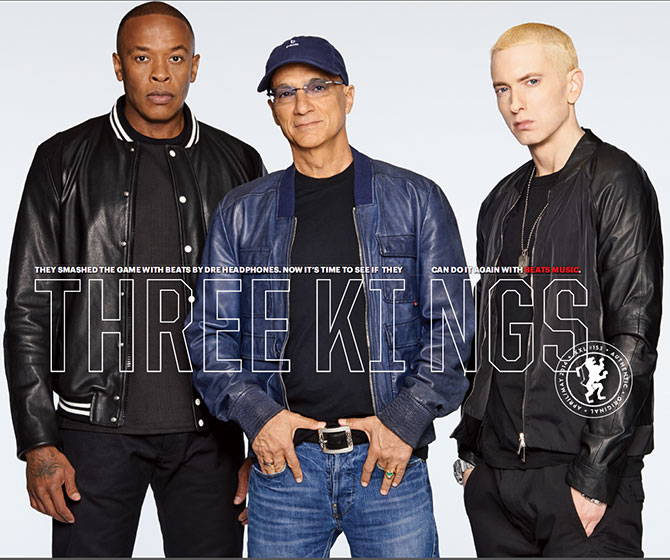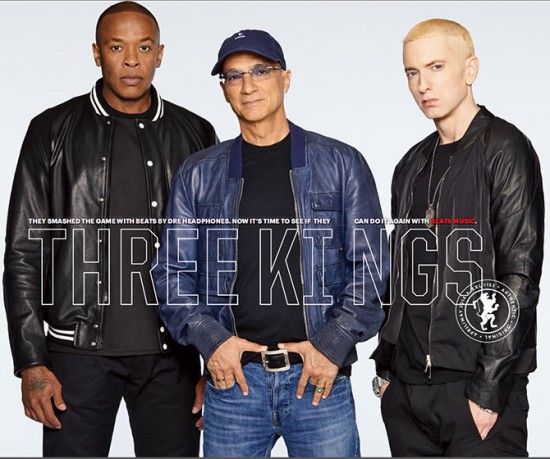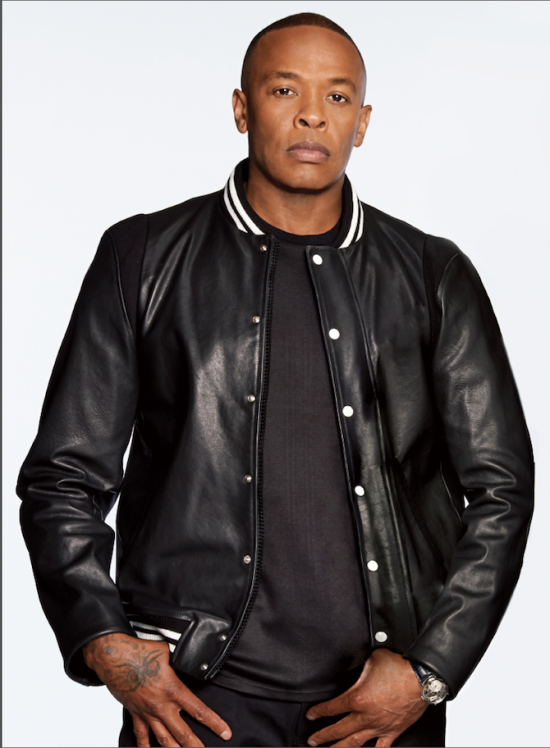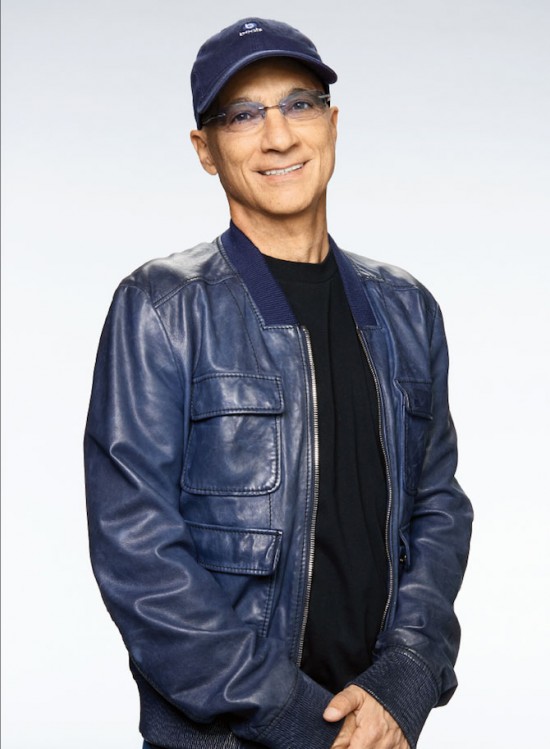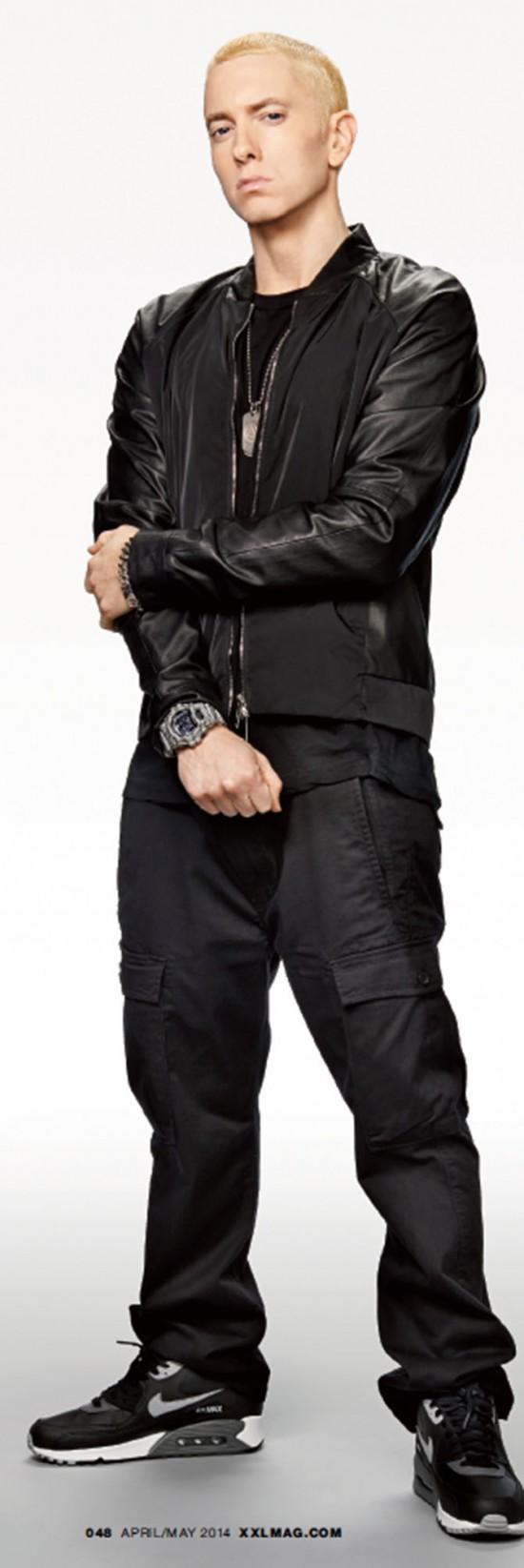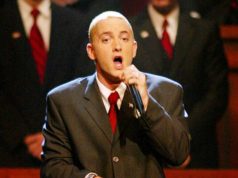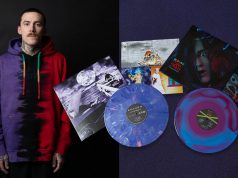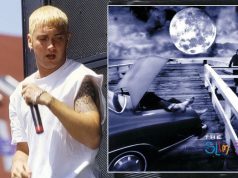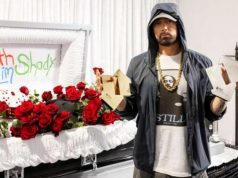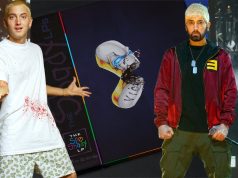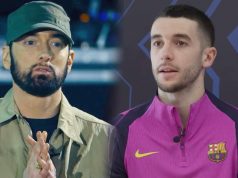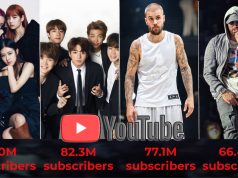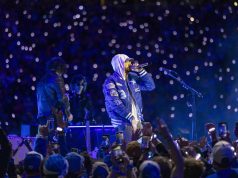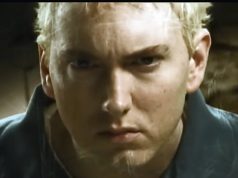They smashed the game with Beats By Dre headphones. Now it’s time to see if they can do it again with Beats Music.
Interview By: Vanessa Satten
Photos By: Tom Medvedich
Originally Published April/May 2014
THE THOM THOM CLUB is the perfect place for a photo shoot with music powerhouses Dr. Dre, Jimmy Iovine and Eminem. The hidden building sitting off a main drag in Santa Monica is owned by Universal Music Group and regularly serves as both a photo and recording studio for artists under the Interscope subsidiary. On this sunny day in late January, Em,Jimmy and Dre have joined forces to pose for their fi rst magazine cover together, ever. Over the past decade-plus the three music vets have garnered an immense amount of success with each other. Jimmy, the chairman of Universal Music Group’s Interscope Geffen A&M Records, linked with hip-hop superstar producer Dr. Dre over 20 years ago, and the two have been pushing the music industry forward ever since. Dre houses his label Aftermath Entertainment under Interscope, so all of Dre’s artists are also a part of the Interscope roster. This includes rap titan Eminem, who’s been signed to Dre’s label since 1998 and has sold 96 million records as an Aftermath/Interscope artist. And his label Shady Records sits under the Interscope umbrella.
Six years ago Dre and Jimmy, both former studio engineers, launched a line of headphones called Beats By Dre. The brand immediately took off , and over the past six years the headphones have become an integral part of hip-hop and music culture. This year parent company Beats Electronics—which was co-founded by Dre and Jimmy, who is the current acting CEO— began their newest endeavor, Beats Music, a music streaming service that focuses on the curation of playlists created by the most credible names per music genre. Beats Music is a huge step for Beats Electronics, which kicked off the service with a commercial spot made by Eminem and featured his hit single “Berzerk.” Although Em isn’t a co-founder of Beats, he regularly lends his megastar support to Dre, Jimmy and many Beats Electronics endeavors. XXL spoke with the hip-hop heavyweights about their continuing domination.
DR. DRE-THE GOOD DOCTOR MAKES HITS BUT RARELY TAKES THEM.
What made you guys want to get into the business of streaming music?
Well, this was originally Jimmy’s idea. He’s been talking about this for a long time. Just trying to come up with a way to possibly save the music industry. So it really down to that, just trying to come up with a way to save music and a different way of presenting it to the audience.
Do you think the music industry needs saving?
I believe so, especially for the artist’s sake. Coming from a producer’s perspective, the producer is probably the last on the totem pole to get paid now because once an artist makes a record, he has the ability to go out and do shows to make money.
The days of the super producers aren’t that important anymore, right?
No, it’s not. Right now it’s about what you’re gonna do on that stage, and there’s not that many producers that have that ability. So this is hopefully something that can change that.
A big part of Beats Music is the curation. Why is that important?
It’s important because human beings listen to music, so human beings should be able to pick what humans listen to. This is another thing that Jimmy has talked about, and I agree with it also because I come from a DJ background, and it’s so important to know which song comes next. That’s all it’s about. No matter where you are or what you’re doing, it’s always great if you don’t have to get up and physically change the song that plays next.
The right sequencing seems like it is so important to a project.
I really believe that sequencing an album is just as important as the songs that are on an album.
What’s your process for sequencing an album or even a playlist?
I sequence during the entire recording process. The sequencing changes as I’m recording and as I’m listening. From when I’m like four songs in, I start trying to figure out which song should come after which. Which is important, and it changes as the album goes. So usually by the time I’m done with an album, I already know how the album should be sequenced. It keeps the flow going, and I think that’s one of the reasons why my albums have really been so successful is because of the sequence and because of the curation.
The opening track or first thing you hear on the project is pretty important also…
It’s so important, even the intro. Intros are so important because they set the stage. Those are the advertisers.
Speaking of advertisers, there are so many people wearing Beats headphones these days, it’s like an advertisement itself.
I’ve gained an entirely new popularity because of the headphones. It’s like I haven’t been outside in years and haven’t seen them somewhere. It makes me proud to be a part of it. It’s also making a statement to the person that buys these headphones. It’s like I look at you and I see you really care about what your music sounds like.
Has Beats been more financially profitable than the music-making business for you?
I would have to say financially that the headphones have benefitted me, like a tremendous amount of money there. I can’t even explain to you how happy I am in that area, but I’m a music guy. I like being in the studio. I’m actually inspired to be back in the studio again. I was actually going in the studio for a long time out of obligation more so than to be there. But now I’m inspired to be back and do what I love.
What’s inspired you?
I don’t know. I just really had that itch to be in the studio, so I’ve been back in for the last few months. My inspiration came from I don’t know where. I just woke up and I wanted to be in there. The difference between the headphones and making music, it’s like, okay, I have a new business here that I’m proud of, but my soul still remains in
the music-making process.
How has what you have done with the Beats brand affected music directly?
I think that it’s gonna motivate a lot of guys that are in hip-hop to go out and try new and different things that have to do with sound. I think a lot of guys come into the business, and the first thing you want to do is maybe start a shoe line or clothing line, but there’s so many other things that we can do, more organic to what we do. I’m not knocking anybody—get your money— but there are other avenues that are a lot more organic to what we do. I can’t sell shoes. I wear the same shit every day. I can’t sell liquor. I like to drink it, but I don’t know how to sell it. I know sound, and this is what I’m going to stick to, what I know.
JIMMY IOVINE-HE IS THE HEAD HONCHO, THE BOSS OF ALL BOSSES AND NOW THE BEATS MUSIC
Why did you want to get into the business of streaming music?
That started about 2000 when I saw Napster and I saw the industry taking a very polarizing approach toward it. I’ve always wanted to do subscription-based music, and I’ve been working towards it for a good 12 to 13 years now, and this was the right time to do it because we cracked the headphones market and the Beats brand. To complete the circle, I thought Beats Music, it’s the right time for it.
You guys have all sorts of partners making playlists and curating content. Why is that important?
Right now all there is is access. We have access to 20 million songs, and it doesn’t do people a lot of good if it isn’t curated to a certain extent. We plan to take our curation really far and really deep. And a mass of songs is not something that’s going to help the record business or help the artist. Right now it’s being promoted as access. And I just believe that curation is helpful, and we’re trying to make people’s lives easier and more fun, and that’s what we do.
So it’s like before theInternet when magazines were the role of the main trusted source and told the reader what was good?
It’s the same feel, only on a much broader scale because we’re dealing with all genres. But we also have a great technology to help us. We have great algorithms that can help match people with their taste in music and give you music that’s a complete thought. That gives you a complete context. It’s really needed in the music industry: Artists need it, labels need it, and the consumer also needs it. Just to say to someone, “Here’s 20 million songs, give us $10 a month and good luck,” is not really a goodmessage or a good offer. The only thing that is as important as the song that you’re listening to is what comes next. We are really working on making that great.
You and Dre have been working together for over 20 years. Are you surprised by the success this many years later?
Dre and I really just connected on a certain level. And our very first connection was audio. We both come a recording engineer background, and we both shared a point of view on audio, and how important it is and the translating of emotions in music. It’s the only conduit, emotions in music. You don’t have anything else really. You have videos, but the truth is at the end of the day, that song has got to play. Therefore it has to transmit the emotion that was originally intended by the artist. So we share that, and we’ve had an awful lot of success… Dre’s about making that music powerful, and he went on a campaign to turn on an entire generation to audio, and it seems to be working, and we’re most proud of that.
How does Eminem fi t into all the Beats stuff?
Eminem is a very important character, a very important person, an artist. He and [Eminem’s longtime manager] Paul Rosenberg,who is also a very important character, are very close to the Beats brand and have been since day one. Eminem only does stuff that’s exactly right, from his perception, feelsright. He doesn’t compromise. He does only stuff that he can really believe in, along with Trent [Reznor, the chief creative officer of Beats Music], who is a similar type person with the credibility, authenticity and the
commitment to the brand.
Have you had more financial success musically or with technology?
Well, financially I’ve been very fortunate. I came out of Red Hook, Brooklyn, when I was 20 years old, and I had a feel for making music. I’ve always done okay. I’ve been very fortunate. I got a job at a record label when I was 20 years old. It was just cleaning up, but it was better than what I was doing. I was sweeping up at A&P [supermarket], so this was a big step forward. And just ever since then, it’s been good. Dre and I just started a school. It’s a school in USC [USC Jimmy Iovine And Andre Young Academy]. It’s exactly what Beats represents. It’s the marrying of technology and popular culture.
EMINEM-MARSHALL SUPPORTS THE HOME TEAM.
What did you think when Dre and Jimmy first told you about the idea for Beats By Dre?
I felt like, okay, the fact that Dre’s doing headphones, people are going to respect it regardless because they know it’s Dre and they know he’s not going to put out a non-quality project. And the fact that he told me he was literally involved down to the last detail and tweaking them and making them sound the way they do, I truly believe that they’re the best headphones I’ve ever heard. And I’m sure that pretty much a lot of people agree with that, but I had no fucking clue that it was going to be like this.
So what did you think about the idea for Beats Music?
It’s incredible, obviously. Whenever they tell me that they’ve got some kind of new idea, I always listen, and I always feel that it’s going to be somewhat successful just because they’re visionaries. Their vision is incredible with the headphones and with everything that they’ve done with Interscope. They kind of see a picture before it happens, and that is incredible.
Is it an honor to still be working with Dre and Jimmy and being able to lend your support to their projects?
It’s an honor to be a part of it, absolutely. To be a part of Interscope, period. I still always look at myself as an Aftermath artist, Aftermath/Interscope. I’m that before anything to do with Shady.
Speaking of Shady, what are you working on right now?
The focus right now is basically Slaughterhouse and Yelawolf.
Have you been happy with their work so far since signing?
I’m happy with both so far, everything that they’re doing. I just recently got back in the studio, back to producing myself within the last month or so.
Yeah, it seems like it’s been a while since you were making beats.
Yeah, it has because usually what I would do is for some reason when I got sober, I just wanted to focus on writing. So the Relapse album, Dre pretty much produced thatentire thing. He did every beat on there, and it was a good way for me to, I guess, be able to open up my mind and be able to create lyrically. And it was a fun time period for me, but there was a whole time period for me that went by when I wasn’t really doing any producing. And then I kind of started dabbling in it again as far as Recovery, co-producing and things like that, adding different elements to a beat to try to build the song up, put some dramatics on it or whatever, but even then I wasn’t really doing an entire beat from scratch myself. It was more about just kind of overseeing. I still want to make sure that it sounds like me, but, ya know, it’s obviously a little
more updated.
How do you decide on what to work on next?Your artists or yourself…
Well, I don’t know. I mean I think that it comes naturally. That depends on what kind of groove we get in as far as like, Wow, I just said groove…But yeah, it depends on…like if Slaughterhouse comes to town, then I’ll start working on that.
How much do you like the business side of the music industry versus being on the musical side?
Yeah, that’s me, the second one. Because if I get too wrapped up, and not to say that I’m totally ignorant to it and that I don’t know what’s going on, but at the same time, I’d rather just not have my hands in that because, ya know, my job, I look at it as, to create music because if I’m trying to do too much at once then I will never be able to do shit as far as creating. So I’d rather just focus on that.
You’ve had eight solo albums and sold millions upon millions of records. Do you see a time coming where you won’t care about putting albums out anymore?
I’m sure that there’s probably gonna be a point when people are not gonna care what I have to say. And, ya know, one day there’s probably gonna come a point where it’s probably time to put the mic up. But as far as what I’m gonna end up doing, I might know my plans for tomorrow, but I don’t know anything after that. I might know my plans all the way ’til fuckin’ Friday, so everything is subject to change, but I guess it just depends on how I feel, but I feel like right now, like, to me, I love music and I love hip-hop so much that whether I had all the money in the fucking world or not a dime to my name, I still would be rapping. I still would want to write, and I still would want to do this and be involved in the music just because it’s all I know, really.
Anything else you wanna add?
I don’t have anything to add except for the fact that there are some shows coming up with me and Rihanna. It’s a three-city tour: New York, L.A. and Detroit coming in August.The Monster Tour.


